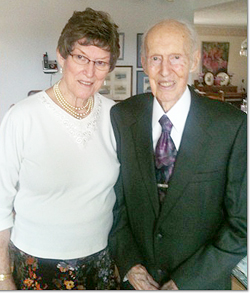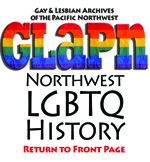HEARTS AND VOICES: RITA AND CHARLES KNAPP
Personal Recollections of Oregon Gay History
By George T. Nicola
Last updated April 10, 2011
1. One of those historic moments
 In the spring of 1973, I spent a lot of time lobbying for HB 2930, the first Oregon statewide bill that would ban employment and housing discrimination based on sexual orientation. There was a limited amount I could do, so I spent most of my time in Portland rather than in Salem.
In the spring of 1973, I spent a lot of time lobbying for HB 2930, the first Oregon statewide bill that would ban employment and housing discrimination based on sexual orientation. There was a limited amount I could do, so I spent most of my time in Portland rather than in Salem.
What would become today’s large and powerful Oregon LGBT movement was in 1973 just a handful of us. We jumped at any chance to address groups about our issues. At some point, we were invited to speak to a Portland area Christian center called Menucha.
The co-directors of Menucha were a minster named Charles Knapp and his wife Rita. I struck up a conversation with Rita. She told me her daughter Kristan was a lesbian.
Rita and I talked a few times after that. At some point, I mentioned to Rita about our civil rights bill in the Oregon Legislature. I invited her to attend the upcoming House committee meeting which would take public input on the bill.
2. The hearing.
When I arrived at the hearing, there was a room full of people. I was glad when I saw Rita get up to testify.
Her speech lasted just a few minutes. But her words in support of her lesbian daughter were so moving and sincere that they would become the Gettysburg Address of parents who love their gay children.
“I am the parent of a gay woman”, she told the committee. She had come to know her daughter’s friends as socially conscious, intelligent, educated, warm and happy persons. She continued, “People must recognize that everyone has the right to be free to choose the life style he [or she] wishes. We of the establishment must disengage ourselves from myths and vague fears.” (“Homosexual issue argued in the House”, Oregonian, 5-3-1973 or http://0-docs.newsbank.com.catalog.multcolib.org/openurl?ctx_ver=z39.88-2004&rft_id=info:sid/iw.newsbank.com:EANX&rft_val_format=info:ofi/fmt:kev:mtx:ctx&rft_
dat=1311C53B8F7A20B0&svc_dat=HistArchive:ahnpdoc&req_dat=0D10F2CADB4B24C0).
The meeting was to last only an hour, so we had been forbidden to applaud. But the crowd could not hold back after hearing Rita’s words, and burst into a thunderous ovation. Not expecting this, poor Rita was afraid that, in the process of rising from her chair, she had knocked over the microphone.
3. Aftermath
At that time, few gay people were out to straight people, unless it was to their closest friends. The vast majority, fearing rejection, probably kept it secret from their families. Parents of gay children were supposed to be ashamed of their kids. Wasn’t that a shortcoming of their parenting? And even if they were not ashamed, they certainly would not talk about it in public.
But here for the first time, an Oregonian spoke in support of her gay daughter in a very public meeting where the press was present.
As you can see from my above link, Rita’s testimony was the lead paragraph in the Oregonian article about the hearing. But Rita had not wanted to be the center of attention. She only wanted to say something that meant a lot to her. The first sentence of the Oregonian article read “A mother spoke.” The letters before that – “AP” -- indicated that Rita’s story would go over the wires throughout the country through the Associated Press.
4. The Formation of PFLAG
In the subsequent years, the Knapps worked with a number of organization promoting LGBT equality and acceptance. For instance, they campaigned against the very anti-gay Ballot Measure 9. They were members of the Portland’s First Congregational Church, the United Church of Christ. UCC’s national organization had already been promoting the acceptance of gays for a couple of decades. As moderator for his local church from 1991 to 1992, Charles led his led First Congregational in becoming open and affirming of LGBT people.
But perhaps the Knapps are best known for their contributions to Parents and Friends of Lesbians and Gays (PFLAG). Several years after Rita addressed the legislative hearing, Rita and her husband Charles teamed up with another couple named Ann and Bill Shepherd to found what is today called PFLAG Portland. The Shepherds had a gay daughter named Susie.
Soon, other PFLAG chapters would form in Oregon cities other than Portland. PFLAG became a powerful voice for gay equality and dignity.
5. PFLAG’s legacy
For me as a gay man who came out in 1970, PFLAG has a special meaning. Before 1972, male or female homosexuality was criminal in Oregon. Only recently were we given statewide civil rights. But much crueler than an absence of equality was the pervasive message that we did not belong. So it was at one time very difficult for all us to come out. If we did, we were sometimes shunned by friends and family. And because most of our parents do not share our sexual orientation, they have no frame of reference for how we feel. There are few things more emotionally wrenching than becoming withdrawn from the people who brought you into this world.
The Kansas-based Westboro Baptist Church (WBC), is an independent Topeka church whose website “http://www.godhatesfags.com” tells a lot about its stance. WBC maintains that because the US tolerates homosexuality, various punishments are inflicted on Americans as a group, including the killing of soldiers at war.
Using this pretext, WBC pickets various sites throughout the nation. Last spring, they picketed ten different Portland sites, most of them synagogues and Christian churches.
At one house of worship, the clergyman told me that his son was gay and that he had gone to PFLAG meetings. At another, I saw a man just standing there, doing and saying nothing. I struck up a conversation. He quickly told me that his son was gay. He added that he was glad his son would have an easier time than my generation.
So to Bill, Ann, Rita and Charles -- thousands of Oregon gay men and women who at one time would have been estranged from their families, are now lovingly accepted by them. That is because countless Oregonians have received your message Thank you for defending the right to belong. Thank you for keeping families together.
Read more about Rita & Charles Knapp, and the Portland PFLAG organization, here.
Charles and Rita Knapp both passed away in 2013, and their children created a website to tell their stories. Visit this link to read more about the lives of Charles & Rita.
P.O. Box 3646 • Portland, OR 97208-3646 • info@glapn.or
Copyright © 2015, Gay & Lesbian Archives of the Pacific Northwest

